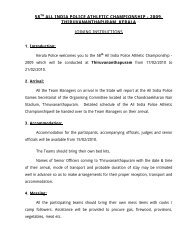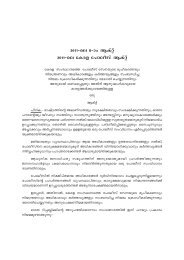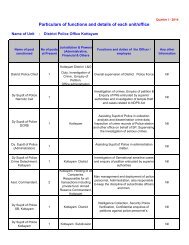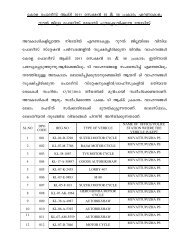Janamaithri Suraksha Project - Kerala Police
Janamaithri Suraksha Project - Kerala Police
Janamaithri Suraksha Project - Kerala Police
You also want an ePaper? Increase the reach of your titles
YUMPU automatically turns print PDFs into web optimized ePapers that Google loves.
Marad <strong>Police</strong> Station (Kozhikode)<br />
Setting up a JSP in Marad was a bold decision on the part of the <strong>Kerala</strong> <strong>Police</strong>. In January<br />
2002 there were communal riots, followed by a second round of hostilities in May 2003. During both<br />
encounters Muslims and Hindus died, resulting in an incendiary environment that forced many Muslims<br />
to flee the area. When people returned to their homes, the District Collector converted a school into<br />
a camp for the displaced. After staying there for eight to nine months, these people were eventually<br />
relocated to their abandoned homes. Subsequently, relations between the two communities were<br />
tense and they rarely spoke to each other. To ensure that violence did not break out again, the <strong>Kerala</strong><br />
police set up an extensive network of checkpoints in the affected areas. These checkpoints were<br />
designed to monitor the flow of people and goods into and out of the area.<br />
In that backdrop, a JSP was set up in August 2009 during Phase II of the community policing<br />
project. With eight Beat Officers each responsible for at least 1,100-1,250 households, the police<br />
in Marad had their work cut out for them in this religiously divided community. For instance, according<br />
to CI Abdul Kader, tensions ran so high that at the inception of the JSP in Marad the community did<br />
very little to cooperate with the police on a census that was being conducted at the time.<br />
As a first step, the police approached the residential associations as a means to improve<br />
relations with the community. Initially, some community members balked at the outreach. However,<br />
with time and persistence, the police could organise joint events that involved people from both the<br />
communities. In particular, a successful initiative was the <strong>Kerala</strong> police-facilitated training for women<br />
of both communities to jointly learn embroidery. The first session involved 75 women and a subsequent<br />
session had 50 women participants: This collaborative venture, involving the police and both religious<br />
communities, started breaking down barriers and improved the space for dialogue and healing.<br />
However, notwithstanding the recently achieved progress, it is an uphill battle to restore full<br />
normalcy to this communally-affected area. In the immediate aftermath of the riots, 30 police<br />
checkpoints were set up to ensure that community members and/or outsiders were not organising<br />
further agitation or bringing in weapons. Over seven years later, 11 checkpoints still remain. While<br />
the objective of these checkpoints is ostensibly to monitor the flow of people and goods, the fact<br />
remains that police interventions at these pickets are perfunctory and routine. No attempt is made<br />
to inspect passing vehicles closely; only names are checked. If the JSP’s objective is to establish<br />
greater trust between the police and the community; these police pickets have precisely the opposite<br />
effect. They are intrusive, an annoyance and place a constant cloud of suspicion over the populace.<br />
This is not an effective tactic to engender greater trust. And if the objective is security, then that<br />
also is not achieved since the rules no longer appear to be scrupulously applied. It appears that if<br />
the police are truly sincere in forging a healthier relationship with the community that is rooted in<br />
confidence and trust, then they should remove the remaining 11 checkpoints that only serve to<br />
stigmatise both Hindus and Muslims in the area .. Some people have stated that the Beat Officers<br />
deployed in Marad have been unable to forge the kind of communication and dialogue that would<br />
permit the removal of the police pickets. If that is the case and this failure is due to overextension of<br />
duties or lack of capacity, then efforts should be undertaken to improve the quality of their training or<br />
to improve the quality of the Beat Officers selected to do this difficult job in Marad.<br />
Palarivattom <strong>Police</strong> Station (Kochi)<br />
Started on 26 March 2008; the JSP in Palarivattom currently has six Beat Officers covering<br />
over 22,000 households. There are six two-wheelers for the Beat Officers, two scooters for the six<br />
women Assistant Beat Officers and one collective jeep. While accompanying Beat Officers on<br />
their patrol, it was evident that the JSP has done a very good job in reaching out to the community<br />
and is doing its best to address the scourge of alcoholism. In exchanges with the public, they<br />
articulated satisfaction with police performance and were happy that crime in the neighbourhood<br />
had declined since the JSP was started. Moreover, the influence of the JSP has resulted in less<br />
quarrelling within the community. Having the opportunity to express grievances to authoritative<br />
figures who are sympathetic and responsive, has minimised the tendency for community members<br />
to escalate otherwise straightforward disputes.<br />
33

















